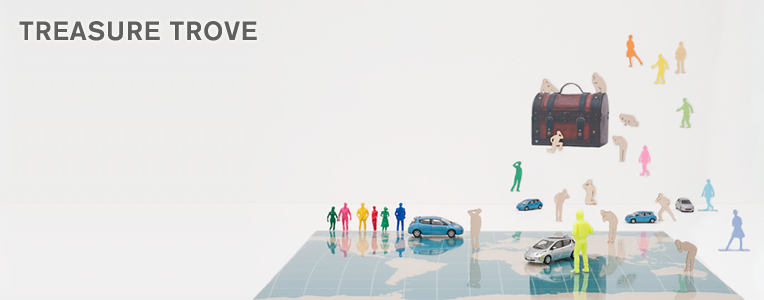Treasure Trove

There is a treasure trove in Nissan's plants. But it's not gold or silver. It's called "NPW." And the man who's "guarding" the hoard is NPW Promotion Expert Leader, Hiroshi Ichikawa.
Forget trinkets and jewels. The treasure Hiroshi Ichikawa is showing us is a book. Its title is NPW - Nissan Production Way. This, he explains, is Nissan's fortune. It looks just like any ordinary booklet, yet the content has been revised twice in nineteen years and is evolving every day. This bibliographic treasure was "minted" in 1994, when Nissan's overseas manufacturing bases were continuing to expand and the product quality it had cultivated in Japan now urgently needed to be transmitted globally. NPW was the bible that Nissan created, invested with all its know-how on making and creating vehicles.

Hiroshi Ichikawa Joined Nissan Motor Co.,
Ltd. in 1982. General Manager, NPW Promotion Department. Created the concept of "Douki-Seisan" (Synchronized Production) and developed global manufacturing management. Head of the Global Training Center.
What is Nissan Production?
Ichikawa has led NPW from the start. "Till then Nissan had constantly engaged with quality and improving productivity," he says. "But we had run into an unexpected wall. NPW was created out of wanting to break through this wall. We aimed to invest Nissan's way of Monozukuri (manufacturing) all over the world." Defining this unique way of Monozukuri was the fundamental catalyst.
And from this came the NPW concept: "Two Never Endings." Firstly, there is the never-ending synchronization (Douki) of manufacturing with Nissan customers. This constructs a relationship of trust with customers. And then secondly, the never-ending quests to identity problems and put in place solutions. This engages with improving how to eliminate problems that arise in manufacturing.
Even in ten thousand vehicles, not one defect is to be overlooked and quality should match the expectations of each and every customer (Synchronization of Quality). All manufacturing processes without merit for the customer are wasteful (Synchronization of Cost). Implementing the shortest possible period to final delivery by reducing not only the production process but also the development lead time (Synchronization of Time). NPW puts all of these methodologies on paper in ways that are easy to understand for readers.
"Sharing these 'two never-ending' concepts was the driving force for creating innovation in manufacturing. It changed manufacturing to being the overall optimal discussion of what we should do to create better Monozukuri for the customer."
And by sharing this mindset for Monozukuri, around the world they could then start implementing concrete approaches to attaining goals. For example, they focused on the "flow" of materials and parts entering the plant, and then eventually reaching the customer.
Another change that arose was regarding information. The company came to believe that the best method was not to forecast a manufacturing plan, but rather making a clear plan based on information about customer orders, in other words, a fixed time and sequence schedule.
In 1997, the fortune, "Douki-Seisan" (Synchronized Production), was introduced company-wide. It was defined as obtaining customer order information simultaneously by all processes from upper to downstream of lines, and, without causing any off-line repairs, establishing a consistent line flow and production with no production sequence disorder. It meant adopting a whole new concept regarding inventories and data, and a new motto of zero defects, zero breakdowns.

One of the Nissan Production Way books, a bible collecting all the know-how behind Nissan's Monozukuri (manufacturing). It has been revised and updated twice over the past nineteen years.
Inheriting the fortune
Expert Leader Hiroshi Ichikawa tells us a secret. "There's an even more important treasure in Nissan plants: People." NPW doesn't use the words "manpower" or "human resources." It considers the team to be "rich" in its staff, that it has "personal assets" in the real sense of the word. It is due to the strength of the team that Synchronized Production can be implemented. NPW is indispensable for building up this "wealth." "Ultimately, Monozukuri is making people, not things," he says. "It is such fun to see people evolving NPW by themselves."
Ichikawa's NPW Promotion department is the team working to convey the ethos of NPW to plants worldwide. Their own "assets" are the materials they take with them to production bases all over the globe - not just the NPW books, but also videos and presentations. That the quality of Nissan vehicles continues to improve is thanks to the efforts of the NPW and the treasure it shares. And when customers then get into the results of everyone's endeavors and drive away, the fortune is inherited and passed onto where it is really intended to be spent.

